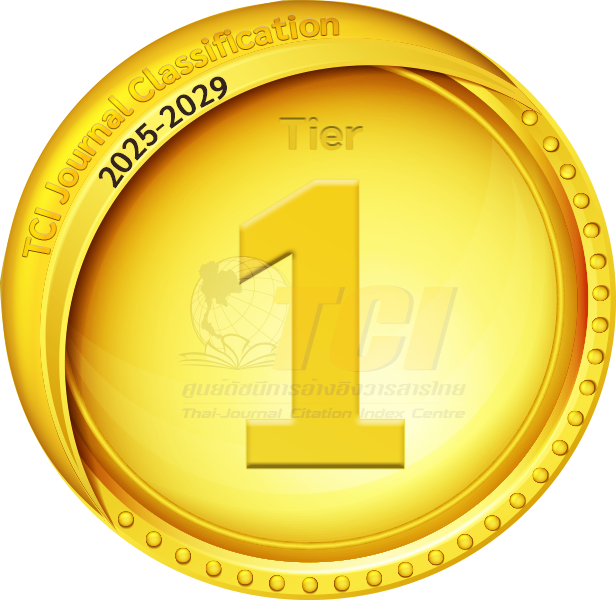The Patient Radiation Dose in Whole Abdomen and Thorax Computed Tomography at Songklanagarind Hospital
Abstract
The purpose of this study is to determine the patient radiation dose and the factors affecting in order to develop the potential methods for the radiation dose reduction. The basic population consists of 100 patients who underwent the chest and abdominal computed tomography examinations at Songklanagarind Hospital. The result shows the average dose length product. DLP, calculated for chest and abdominal CT of 448.10 and 1,192.59 mGy.cm respectively. The average weighted CT Dose Index CTDiw were 8.4 mGy for chest and 11.2 mGy for abdomen. 47 patients or 94 percent for DLP chest CT were lower than the dose reference level of 650 mGy.cm. For abdominal CT, 44 patients or 88 percent of sample population received the radiation dose higher than the dose reference level of 800 mGy.cm. All CTDiw were below the dose reference level of 30 mGy for chest and 35 mGy for routine abdomen.
The major factors affecting the patient radiation dose are the scan techniques such as the tube voltage, tube current, the scan time. the slice thickness. the scan length and the number of the phases or scans. Adaptation of the scan techniques, the reconstruction algorithm and the adjustment of the slice thickness to the appropriate scan length enable the reduction of the patient dose. The result of this study will lead to the awareness of the radiologists and technologists for the proper use of CT especially whole abdomen in young adult and in pediatric studies.
Downloads
Metrics
References
Hounsfield GN. Computerized transverse axial scanning (tomography): part 1. Description of system. BJR. 1973:46:1016-22.
Brenner Du, Elliston CD. Estimated radiation risks potentially associated with full-body CT screening. Radiology 2004;232:735-8.
Nickoloff EL, Alderson PO. Radiation exposure to patients from CT: reality. public perception, and policy AJR Am J Roentgenol! 2001;176:285-7
Rehani MM. Berry M. Radiation doses in computed tomography. The increasing doses of radiation need to be controlled. BMJ 2000:320:593-4.
Gonzalez AB, Darby S. Risk of cancer from diagnostic x-rays: estimates for the UK and 14 other countries. Lancet 2004, 363:345-51.
United Nations Scientific Committee on the Effects of Atomic Radiation. Sources and effects of ionizing radiation. Report to the General Assembly, with Scientific Annexes. United Nations, New York 2000.
Mettler FA Jr, Wiest PW, Locken JA et al CT scanning: patterns of use and dose. J Radiological Protection 2000 20:353-9.
Aldrich JE. Williams J. Change in patient doses from radiological examinations at the Vancouver General Hospital 1991-2002. Canadian Association of Radiology Journal 2005:56:94-9
Office for Official Publications of the European Communities, European Guidelines on Quality Criteria for Computed Tomography, Report EUR 16262, Luxembourg 1999. ISBN 92-828-7478-8.
National Radiological Protection Board-R249. Survey of 11. CT Practice in the UK. Part 2: Dosimetric Aspects. Shrimpton P.C. et al 1991. ISBN 0-85951-342-4.
Hidajat N, Schroder RJ, Vogel T et al. Effektivitat der Bleiabdeckung zur Dosisreduktion beim Patienten in der Computertomographie. Fortschr. Rontgenstr.1996;165: 462-6.
Downloads
Published
How to Cite
Issue
Section
License
Copyright (c) 2023 The ASEAN Journal of Radiology

This work is licensed under a Creative Commons Attribution-NonCommercial-NoDerivatives 4.0 International License.
Disclosure Forms and Copyright Agreements
All authors listed on the manuscript must complete both the electronic copyright agreement. (in the case of acceptance)













